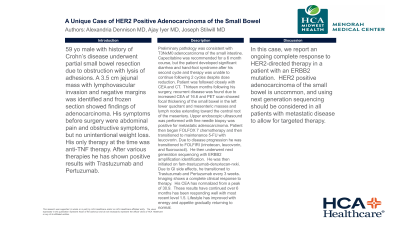Back


Poster Session A - Sunday Afternoon
Category: Small Intestine
A0666 - A Unique Case of HER2 Positive Adenocarcinoma of the Small Bowel
Sunday, October 23, 2022
5:00 PM – 7:00 PM ET
Location: Crown Ballroom

Has Audio

Alexandria Dennison, MD
HCA Healthcare Kansas City
Overland Park, KS
Presenting Author(s)
Alexandria Dennison, MD, Ajay Iyer, MD, Joseph Stilwill, MD
HCA Healthcare Kansas City, Overland Park, KS
Introduction: 59 yo male with history of Crohn’s disease underwent partial small bowel resection due to obstruction with lysis of adhesions. A 3.5 cm jejunal mass with lymphovascular invasion and negative margins was identified and frozen section showed findings of adenocarcinoma. His symptoms before surgery were abdominal pain and obstructive symptoms, but no unintentional weight loss. His only therapy at the time was anti-TNF therapy. After various therapies he has shown positive results with Herceptin and Perjeta.
Case Description/Methods: Preliminary pathology was consistent with T3NxM0 adenocarcinoma of the small intestine. Capecitabine was recommended for a 6 month course, but the patient developed significant diarrhea and hand-foot syndrome after his second cycle and therapy was unable to continue following 2 cycles despite dose reduction. Patient was followed closely with CEA and CT. Thirteen months following his surgery, recurrent disease was found due to increased CEA of 16.6 and PET scan showed focal thickening of the small bowel in the left lower quadrant and mesenteric masses and lymph nodes extending toward the central root of the mesentery. Upper endoscopic ultrasound was performed with fine needle biopsy was positive for metastatic adenocarcinoma. Patient then began FOLFOX 7 chemotherapy and then transitioned to maintenance 5-FU with leucovorin. Due to disease progression he was transitioned to FOLFIRI (irinotecan, leucovorin, and fluorouracil). He then underwent next generation sequencing with ERBB2 amplification identification. He was then initiated on Enhertu. Due to GI side effects, he transitioned to Herceptin and Perjeta every 3 weeks. Imaging shows a complete clinical response to therapy. His CEA has normalized from a peak of 30.9. These results have continued over 6 months has been responding well with most recent level 1.5. Lifestyle has improved with energy and appetite gradually returning to normal.
Discussion: In this case, we report an ongoing complete response to Her2-directed therapy in a patient with an ERBB2 mutation. HER2 positive adenocarcinoma of the small bowel is uncommon, and using next generation sequencing should be considered in all patients with metastatic disease to allow for targeted therapy.
Disclosures:
Alexandria Dennison, MD, Ajay Iyer, MD, Joseph Stilwill, MD. A0666 - A Unique Case of HER2 Positive Adenocarcinoma of the Small Bowel, ACG 2022 Annual Scientific Meeting Abstracts. Charlotte, NC: American College of Gastroenterology.
HCA Healthcare Kansas City, Overland Park, KS
Introduction: 59 yo male with history of Crohn’s disease underwent partial small bowel resection due to obstruction with lysis of adhesions. A 3.5 cm jejunal mass with lymphovascular invasion and negative margins was identified and frozen section showed findings of adenocarcinoma. His symptoms before surgery were abdominal pain and obstructive symptoms, but no unintentional weight loss. His only therapy at the time was anti-TNF therapy. After various therapies he has shown positive results with Herceptin and Perjeta.
Case Description/Methods: Preliminary pathology was consistent with T3NxM0 adenocarcinoma of the small intestine. Capecitabine was recommended for a 6 month course, but the patient developed significant diarrhea and hand-foot syndrome after his second cycle and therapy was unable to continue following 2 cycles despite dose reduction. Patient was followed closely with CEA and CT. Thirteen months following his surgery, recurrent disease was found due to increased CEA of 16.6 and PET scan showed focal thickening of the small bowel in the left lower quadrant and mesenteric masses and lymph nodes extending toward the central root of the mesentery. Upper endoscopic ultrasound was performed with fine needle biopsy was positive for metastatic adenocarcinoma. Patient then began FOLFOX 7 chemotherapy and then transitioned to maintenance 5-FU with leucovorin. Due to disease progression he was transitioned to FOLFIRI (irinotecan, leucovorin, and fluorouracil). He then underwent next generation sequencing with ERBB2 amplification identification. He was then initiated on Enhertu. Due to GI side effects, he transitioned to Herceptin and Perjeta every 3 weeks. Imaging shows a complete clinical response to therapy. His CEA has normalized from a peak of 30.9. These results have continued over 6 months has been responding well with most recent level 1.5. Lifestyle has improved with energy and appetite gradually returning to normal.
Discussion: In this case, we report an ongoing complete response to Her2-directed therapy in a patient with an ERBB2 mutation. HER2 positive adenocarcinoma of the small bowel is uncommon, and using next generation sequencing should be considered in all patients with metastatic disease to allow for targeted therapy.
Disclosures:
Alexandria Dennison indicated no relevant financial relationships.
Alexandria Dennison — NO DISCLOSURE DATA.
Ajay Iyer indicated no relevant financial relationships.
Joseph Stilwill indicated no relevant financial relationships.
Alexandria Dennison, MD, Ajay Iyer, MD, Joseph Stilwill, MD. A0666 - A Unique Case of HER2 Positive Adenocarcinoma of the Small Bowel, ACG 2022 Annual Scientific Meeting Abstracts. Charlotte, NC: American College of Gastroenterology.
